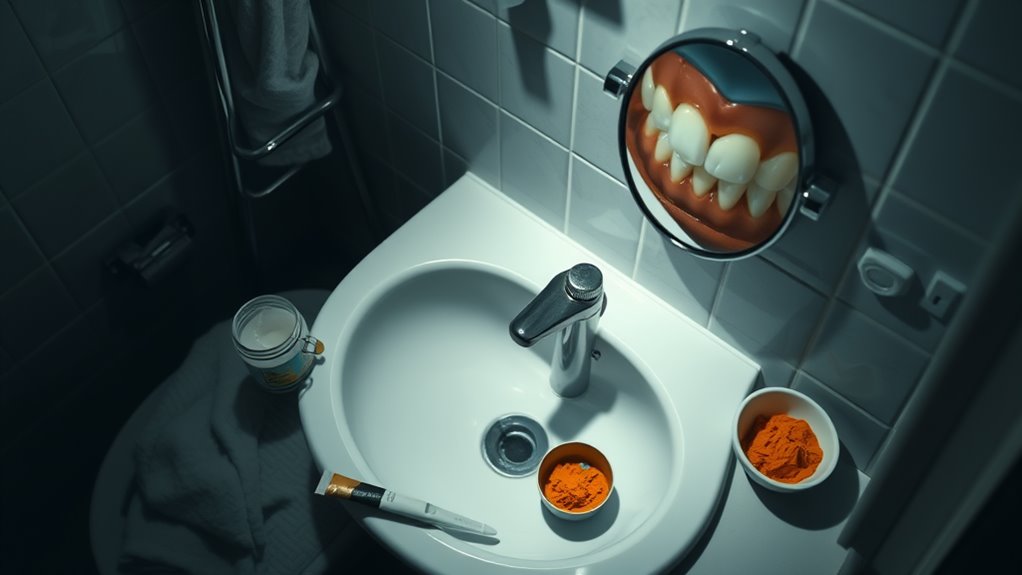Your Toothache Could Mean Something Much Worse!
Your toothache isn’t always just a dental problem – it could signal serious health issues throughout your body. That persistent pain might indicate heart disease, sinus infections, or dangerous systemic infections that require immediate medical attention. Different types of tooth pain tell different stories: sharp pain could mean nerve damage, while throbbing pain might reveal heart concerns. Understanding these warning signs could save more than just your smile.
Understanding the Types of Dental Pain and Their Hidden Meanings
While a toothache might seem straightforward, different types of pain can signal various underlying dental problems.
If you’re experiencing sharp, shooting pain when biting down, you could have a cracked tooth or decay reaching the nerve. A persistent dull ache often indicates an infection or abscess, while temperature sensitivity might reveal worn enamel or exposed roots.
Don’t ignore throbbing pain that extends to your jaw or ear – it could mean an impacted wisdom tooth or TMJ disorder. A metallic taste accompanied by pain might signal a loose or broken filling.
When your gums feel tender and swollen along with tooth pain, you’re likely dealing with periodontal disease. Understanding these pain patterns helps identify serious issues before they worsen.
The Alarming Connection Between Tooth Pain and Heart Disease
Beyond the immediate discomfort of dental pain lies a more serious health concern – its connection to heart disease. The bacteria causing your tooth infection can enter your bloodstream and travel to your heart, potentially leading to endocarditis, a dangerous inflammation of your heart’s inner lining.
Research shows that people with poor oral health have a significantly higher risk of developing cardiovascular problems.
The same inflammation that causes your gums to become red and swollen can trigger inflammation throughout your body, including your arteries. This chronic inflammation can lead to atherosclerosis, where plaque builds up in your arteries, increasing your risk of heart attack and stroke.
Don’t ignore that nagging toothache – it’s not just about saving your tooth, it’s about protecting your heart.
When Your Toothache Points to Sinus and Nerve Problems
Although tooth pain often signals dental problems, it can sometimes stem from sinus infections or nerve conditions that require different treatment approaches.
When you’re experiencing upper tooth pain along with nasal congestion, facial pressure, and headaches, you might be dealing with sinusitis rather than a dental issue. The pressure from inflamed sinuses can compress the roots of your upper teeth, creating pain that mimics a toothache.
Nerve-related tooth pain typically presents as sharp, shooting sensations that extend beyond a single tooth. You might notice this pain triggering from temperature changes or when touching specific areas of your face.
Trigeminal neuralgia, a condition affecting the nerve that provides sensation to your face and teeth, can cause severe, electric shock-like pain that’s often misdiagnosed as dental problems.
Systemic Infections That Manifest as Dental Pain
Systemic infections throughout your body can masquerade as tooth pain, making diagnosis challenging. When bacteria spread through your bloodstream, they can trigger nerve responses that feel like dental issues.
| Infection Type | Key Symptoms | Action Needed |
|---|---|---|
| Endocarditis | Heart valve pain, fever, tooth sensitivity | Immediate medical care |
| Sinusitis | Upper teeth pain, facial pressure, congestion | ENT evaluation |
| Trigeminal Neuralgia | Sharp, shooting facial pain, temperature sensitivity | Neurological consult |
| Ludwig’s Angina | Floor of mouth swelling, tooth pain, difficulty breathing | Emergency treatment |
Don’t assume your tooth pain is just dental-related. If you’re experiencing persistent discomfort along with fever, fatigue, or other systemic symptoms, you’ll need a thorough medical evaluation to rule out these serious conditions.
Warning Signs That Your Toothache Needs Emergency Care
When should you rush to the emergency room for a toothache? If your dental pain comes with severe symptoms, don’t wait for your regular dentist’s office to open.
Facial swelling, difficulty breathing, or trouble swallowing could indicate a life-threatening infection that’s spreading beyond your mouth.
Watch for these dangerous warning signs that require immediate emergency care:
-
Severe swelling that extends to your neck, jaw, or under your tongue, especially if it’s affecting your ability to breathe or swallow.
-
High fever (over 101°F) accompanied by tooth pain, which may signal a serious infection has entered your bloodstream.
-
Continuous bleeding from a tooth or gum area that won’t stop after applying direct pressure for 10 minutes.
These symptoms could indicate a dental abscess or systemic infection that needs immediate medical attention.
Prevention and Professional Care: Protecting Your Overall Health
The best defense against emergency dental situations lies in consistent preventive care.
You’ll need to brush twice daily with fluoride toothpaste, floss regularly, and maintain a healthy diet low in sugary foods. Don’t skip your six-month dental checkups, as they’re crucial for detecting problems early.
Your dentist can spot potential issues before they become painful emergencies and provide professional cleanings that remove stubborn plaque and tartar.
They’ll also check for signs of gum disease, oral cancer, and other health conditions that may first appear in your mouth.
Remember, your oral health connects directly to your overall well-being – poor dental care can lead to heart disease, diabetes complications, and other serious health issues.
Take action now to protect your future health.




